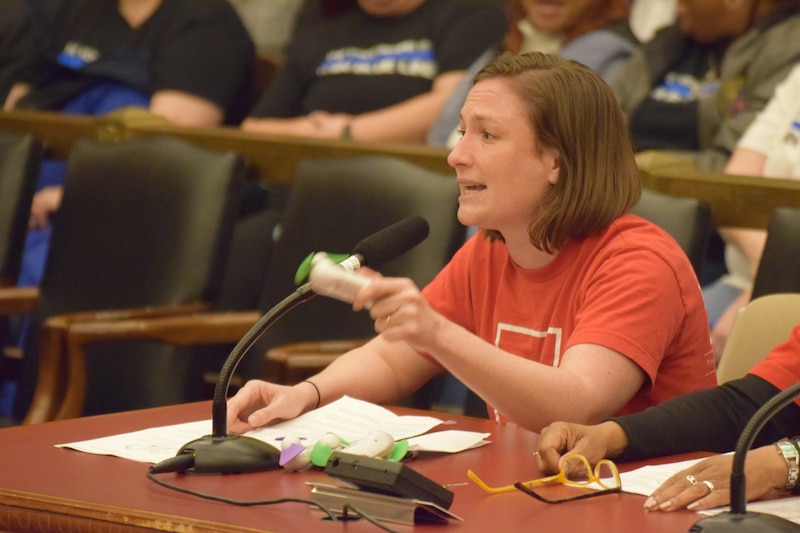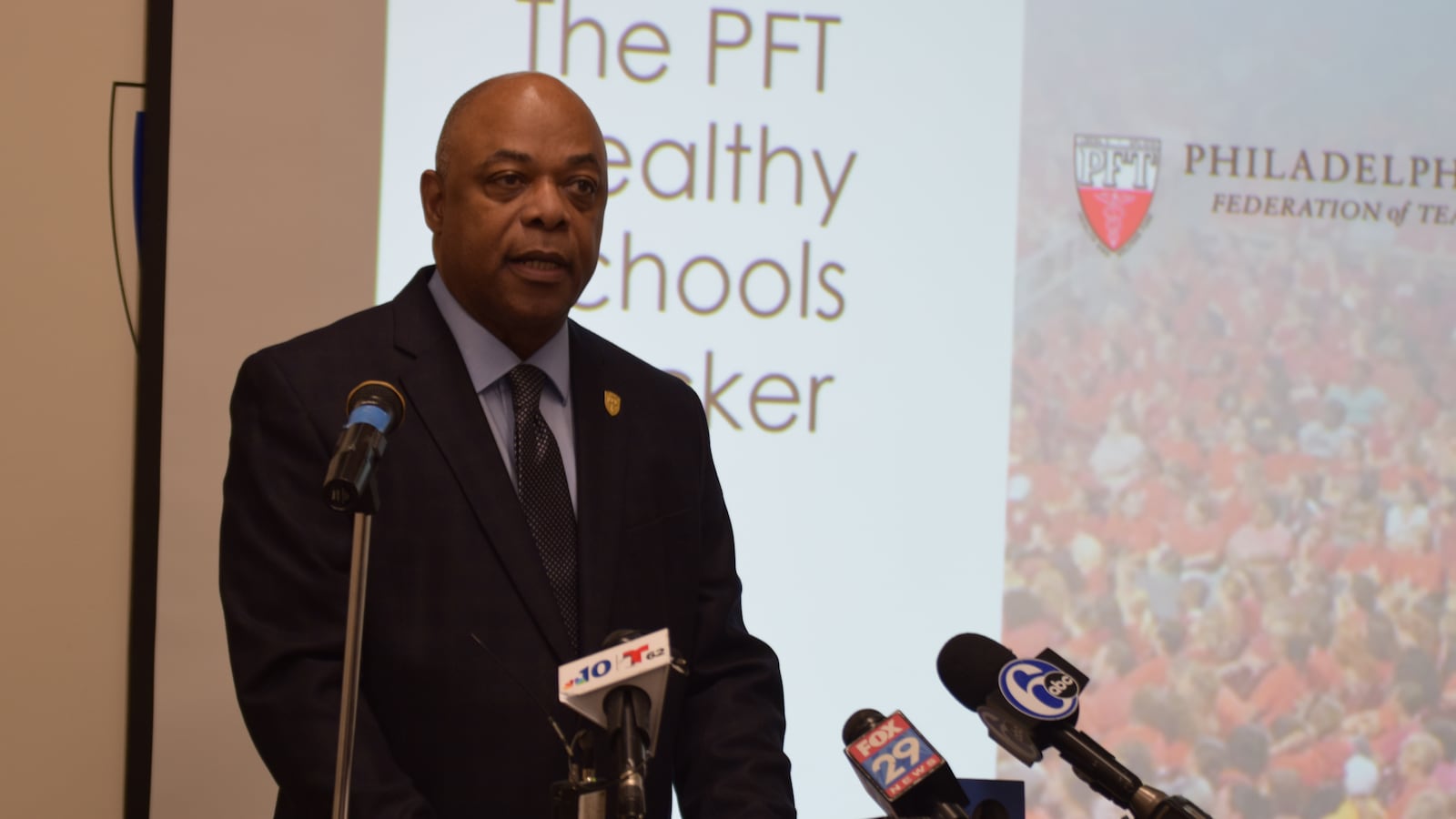This article was originally published in The Notebook. In August 2020, The Notebook became Chalkbeat Philadelphia.
Jerry Jordan has won re-election as president of the Philadelphia Federation of Teachers, turning back a strong challenge from an insurgent group that sought to move the union into more grassroots activism.
PFT issued a statement saying that with roughly 60% of the vote counted, Jordan was the clear winner, without giving a vote count. The challengers, the Caucus of Working Educators (WE), said Jordan and his team received 4,453 votes while its slate received 2,761 votes, with nearly 471 split ballots yet to be counted.
In his statement, Jordan thanked the members and said that his Collective Bargaining, or CB, team – which has run the union for since 1983 – will continue to work for more investment in schools.
He described the campaign as “spirited,” adding: “Together with the members of the PFT, the CB Team’s leadership has worked relentlessly to shift the anti-public education narrative that has recently swept the nation and permeated all levels of government.”
The statement added that educators in Philadelphia have “laid the groundwork for the national rebuttal against austerity.”
Kathleen Melville, who led the WE slate, congratulated Jordan and said in a statement that “we look forward to continuing to push for a more engaged and empowered PFT membership together.”
Had the WE caucus won, Melville would have been the first woman to lead the union – whose membership is predominantly female – since Celia Pincus in the 1950s, long before it won collective bargaining rights.

Kathleen Melville testifying at City Council last year.
When the WE caucus first challenged the leadership in the election four years ago, it received 1,300 votes, or about a quarter of the total, and the turnout of eligible voters was 43%. This year, turnout increased to nearly 60% and the caucus doubled its vote tally. The WE caucus won about a third of the votes of those who returned their ballots.
“From these results, it is clear that the Working Educators’ vision has resonated with thousands of educators across the city,” WE’s statement said.
During its campaign, WE called for open contract negotiations with the School District instead of the closed process that exists now. When the District was under state control through the School Reform Commission, the union went without a contract for more than five years, and thousands of teachers lost raises that they were due from accumulating experience and education credits. Many were never completely made whole after a contract was finally agreed to in 2017.
“This year, we saw huge growth in support for a movement to build a stronger PFT, a PFT that centers our work around the schools that we and our students deserve,” the WE statement said. “Given the popularity for ideas like open negotiations, fighting for higher wages, no healthcare concessions and enforceable smaller class sizes and caseloads, Working Educators hopes to work with the CB Team to bring this vision into our upcoming negotiations.” The teachers’ contract expires in August.
Jordan, who comes from a family of educators, taught Spanish and English as a second language. He has been president of PFT since 2007 and a union staffer since 1987.
One of the big issues that dominated the campaign was the safety of school buildings, and the WE caucus held several rallies to highlight potentially toxic conditions in several schools, including Franklin Learning Center. Jordan and his team also drew attention to the issue with news conferences and events, and they brought American Federation of Teachers president Randi Weingarten to Philadelphia for a news conference at Hopkinson Elementary School announcing a “rapid response team” of city unionized workers to more effectively respond to reports of loose asbestos in the District’s aging buildings.
Earlier this month, Mayor Kenney attributed to the contested PFT election the increased attention to asbestos hazards this school year and the resulting temporary school closings.
Although its ranks have been thinned by the growth of charters and by school closures, the PFT is the largest union local in the city with 11,000 members. Besides teachers, they include secretaries, paraprofessionals, and other school workers.
Working Educators, made up largely of younger members, emerged about seven years ago. Taking a page from activist teacher unions in Los Angeles and Chicago, they styled themselves as insurgents who want to “change how the PFT operates” by cultivating community alliances and approaching education as a social justice issue, with emphasis on topics like educational equity and recruitment of teachers of color.
WE called for open contract negotiations with the School District that would “demonstrate the PFT’s power” and public attention on “the urgent need for living wages for paraprofessionals, enforceable class size limits, and asbestos-free schools.”
The WE team planned to bring the larger community into the process and treat them as partners with a major stake in the outcome, said Ron Whitehorne in a Facebook post. Whitehorne is a retired teacher and longtime union activist (and former chair of the Notebook’s board). This would have been a major departure from traditional practice.
Jordan’s team, while also drawing attention to safe schools and the need for more resources, emphasized its experience in negotiating and in running the multimillion-dollar Health and Welfare Fund that manages many benefits for teachers and retirees.
For most of the PFT’s history, its leadership focused primarily on the traditional bread-and-butter union priorities of wages, benefits, and working conditions – which mostly included such issues as the length of the school day and control over teachers’ daily preparation time. Historically, it also fought vociferously to protect teacher seniority rights – the right for teachers to choose where they worked rather than allowing principals to hire the staff they wanted – arguing that favoritism would inevitably dominate the process.
But seniority was significantly weakened when the SRC ran the District, and now principals and school leadership teams fill vacancies through a site-selection process. Under the SRC, the PFT was prohibited from going on strike – something that was nearly a yearly occurrence during the turbulent 1970s. There has not been a significant strike since the early 1980s.
The PFT under the CB team did negotiate a limit on class size – 30 students for kindergarten through third grade and 33 for older grades. But teachers say that limit is not effectively enforced, and the WE caucus says it needs to be strengthened.
On Facebook, Whitehorne wrote, in part: “At the root of this contest are two different conceptions of where a union’s power comes from. WE embodies the idea that an engaged, educated, and organized membership is decisive. The CB leadership, more by its practice than its rhetoric, relies on a small team of ‘professionals’ who make and implement strategic decisions.”
Both the CB team and the WE caucus sounded a conciliatory tone in the wake of the results.
“We are one Philadelphia Federation of Teachers,” Melville’s statement said. “Our union is strongest when all of us are involved, and our voices are collectively heard. Working Educators will continue our work of engaging and empowering PFT members across the city to fight for a stronger contract and healthier schools. All across the country, unions like ours are winning more for our members and ourselves. We’re excited to continue to bring this movement to Philadelphia.”
In his statement, Jordan said, “Our team now has the opportunity to continue our push towards a better future. We’re deeply committed to continuing to fight for the schools our educators and students deserve. The stakes are incredibly high – the future of our city, our state, and our nation rely on society’s collective commitment to investing in and prioritizing public education. The PFT, under the CB Team’s leadership, is well poised to lead the charge in Philadelphia. Our fight continues.”

